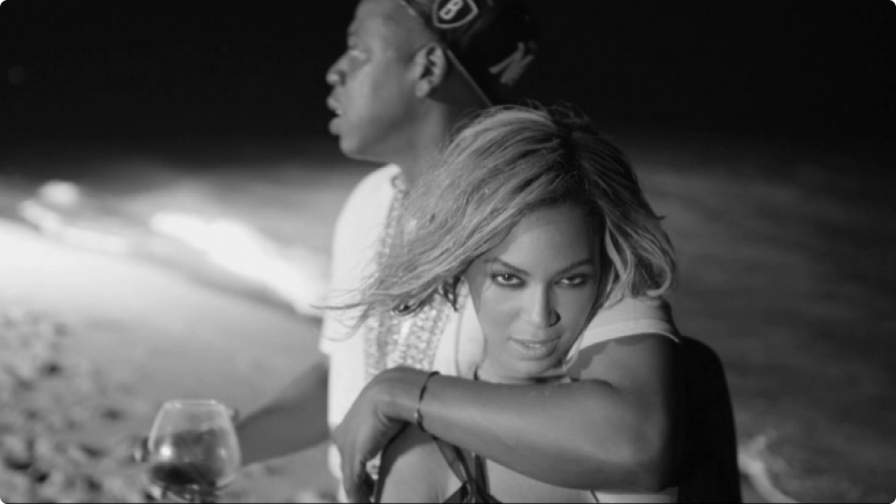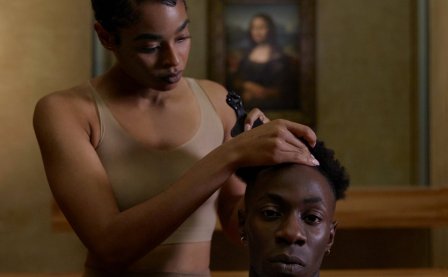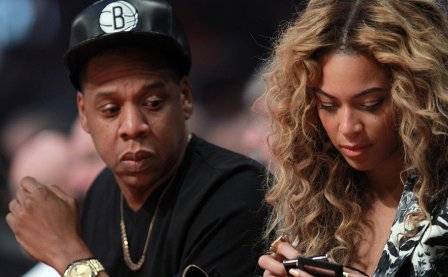In fact, much of the song’s lyrics are in disagreement with the contemporary black feminist theories of difference advanced by the likes of bell hooks and Patricia Hill Collins. By way of illustration, in “Flawless” — ironically the track in which Nigerian feminist Adichie’s sampled speech occurs — an especially problematic representation of the mother’s place within the family dynamic occurs: “Momma taught me good home training/ My daddy taught me how to love my haters/ My sister taught me I should speak my mind/ My man made me feel so goddamn fine”. Patricia Hill Collins asserts in the seminal Black Feminist Thought that “many African-American thinkers tend to glorify Black motherhood… by claiming that Black women are richly endowed with devotion, self-sacrifice, and unconditional love…. The controlling image of the ‘superstrong Black mother’ praises Black women’s resiliency… yet, in order to remain on their pedestal, these same superstrong Black mothers must continue to place their needs behind those of everyone else, especially their sons.” Fortunately, the image of the sexually vital and (mostly) self-acknowledging mother that Beyoncé reserves for herself effectively contradicts this historically rooted mindset.
The Pantless New Woman
“Because I am female, I am expected to aspire to marriage; I am expected to make my life choices always keeping in mind that marriage is the most important.”
– Chimamanda Ngozi Adichie
Beyoncé:
- “All that I can think of is, we should get married / We should get married /… All I’m really asking for is you” (“Mine”)
- “I cooked this meal for you naked / So where the hell you at?” (“Jealous”)[Note: There is a surprising amount of suburban femininity and valuing relative to one’s husband embedded in the album; aspirations towards wedded domesticity are still present despite the overt female sexual desiring that Beyoncé attaches to this social role. This vitality does, however, challenge conceptions of what suburban femininity means: “Just because you become a mother, it doesn’t mean you lose who you are…. You can have your child and you still have fun, and still be sexy, and still have dreams, and still live for yourself.”]
“Now marriage can be a source of joy…”
“Home is where the heart is/ Goddammit I’m comfortable in my skin/ And you’re/ Comfortable in my skin” (“Rocket”)
“And love…”
“In the darkest night hour/ I’ll search through the crowd/ Your face is all that I see/ I’ll give you everything/ Baby love me lights out” (“XO”)
“And mutual support…”
“Ride it so deep/ Ooh my shit’s so good it ain’t even right/ I know I’m right/ Hell yeah, you the shit/ That’s why you’re my equivalent” (“Rocket”)
“But why do we teach girls to aspire to marriage…”
“Take all of me/ I just wanna be the girl you like, girl you like/ The kinda girl you like, girl you like” (“Partition”)
“And we don’t teach boys the same?”
Jay-Z: “I’m Ike Turner, turn up, baby, no, I don’t play/ Now eat the cake, Anna Mae said, “Eat the cake, Anna Mae!”/… We sex again in the morning, your breasts is my breakfast/ We going in” (“Drunk in Love”)
Regarding the videos, another seemingly innocuous observation can be made: other than “Haunted” (where she is explicitly performing sartorial masculinity) and about another 10 seconds of the video-album’s 76-minute runtime, Beyoncé is pantless. Considering the fact that Beyoncé’s mostly bare ass is without a doubt the most ubiquitous image in the album’s visuals (and an unlikely textbook example of overdetermination), this shouldn’t be a revelation. But as is shown in “Haunted,” pants as a signifier has very particular/powerful connotations. Bear in mind the importance of something as superficially innocent as pants during the earlier feminist movements: the “New Woman” with her pants and her bicycle a symbol of female vitality, an appropriation of masculinity in the face of patriarchal rule. But today, does merely appropriating a masculine signifier amount to power?
As an embodied woman, expressing herself bodily is important to Beyoncé’s self-expression in general. If we assume that the majority of Beyoncé’s fans see her as a powerful woman expressing her sexuality rather than a sexualized woman being sold as a product by powerful men, is there anything inherently constricting about these portrayals of overt femininity? In an article/narrative titled “Femmenism” about author Jeannine Delombard’s personal struggle expressing her femininity in the midst of feminist discourse, she discusses the “Renaissance Woman” as a more contemporary version female empowerment where lesbians reclaimed the expression of femininity as one plausible means of self-expression among many. With this in mind, Beyoncé’s feminism and her sartorial/gestural femininity could potentially be a powerful means breaking down the still-common binary between the feminist and the feminine. A large portion of the population still think that feminists are sexless, angry, man-hating, bra-burning women who can only look like this (still the first image that comes up when you type “feminist” into Google), so what happens when it’s Beyoncé’s shaking ass that’s telling the world that “Gender Equality is a Myth!”?
Does that make her recent and controversial (and explicitly pantless) GQ photo-shoot less a college football player’s fantasy and more a celebration of her womanhood and her visible blackness? But if that’s the case, why allow the extensive photoshopping that obfuscates the reality of her body? And if her motherhood is still inextricably tied to her sexuality, why be portrayed in every iteration of a sexualized twenty-year-old? One could offer a shallow abdication such as “industry obligations for a men’s magazine,” but that doesn’t do much for the empowerment of women.
A condemnation of traditional Western ways of knowing?
“We raise girls to treat each other as competitors…”
– Chimamanda Ngozi Adichie
Beyoncé:
“I know when you were little girls/ You dreamt of being in my world/ Don’t forget it, don’t forget it/ Respect that, bow down bitches/ I took some time to live my life/ But don’t think I’m just his little wife/ Don’t get it twisted, get it twisted/ This my shit, bow down bitches” (“Flawless”)
“Not for jobs or for accomplishments, which I think can be a good thing…”
- Writing Personnel: “Beyoncé Knowles, Joshua Coleman, Sia Furler, Ammo, Boots, Noel “Detail” Fisher, Shawn Carter, Andre Eric Proctor, Rasool Diaz, Brian Soko, Charisse Hill, Timothy Mosley, Jerome Harmon, Pharrell Williams, James Fauntleroy, Hill, Justin Timberlake, Caroline Polachek, Terius “The-Dream” Nash, Dwane Weir, Hill, Mike Dean, Miguel Jontel Pimentel, Noah “40” Shebib, Aubrey Drake Graham, Jordan Kenneth Cooke Ullman, Sidney “Omen” Brown, Ryan Tedder, Chauncey Hollis, Rey Reel Music, and Frank Ocean.”
- Production Personnel: “Beyoncé Knowles (executive production), Ammo, Boots, Noel “Detail” Fisher, Pharrell Williams, Caroline Polachek (production on track 5), Timbaland, Jerome Harmon, Justin Timberlake, Key Wane, Noah “40” Shebib, Terius “The Dream” Nash, Ryan Tedder, Hit-Boy, Rey Reel Music, Brian Soko, Mike Dean, Andre Proctor, Majid Jordan, Sidney “Omen” Brown, Stuart White, Chris Godbey, Bart Schoudel, Andrew Coleman, Ann Mincieli, Noel Cadastre, Jordan “DJ Swivel” Young, James Krausse, Mike Larson, Rob Cohen, Jonathan Lee, Ramon Rivas, Rob Suchecki, Hajiba Fahmy, Derek Dixie, Niles Hollowell-Dhar, Tony Maserati, Andrew Scheps, Noel “Gadget” Campbell, Justin Hergett, Tyler Scot, Matt Weber, Jon Castelli, Christian Humphreys, Paul Pavao, Edward Valldejuli, Chris Tabron, Matt Wiggers, Chris Cannon, Carlos Perezdeanda, and Tom Coyne/Aya Merrill (co-mastering).”[Note: There are only four women as compared to 25 men who are given writing credit on the album, amounting to a total of 43 writing credits given to men and 19 given to women (14 of which are Beyoncé’s). The production team is even more skewed: there are 51 men involved and only 3 women (1 woman co-mastered the album, the other was only involved in producing one track, amounting to minimal creative input). For someone oft-championed for her employment of women, these numbers don’t look good.]
- “I sneezed on the beat and the beat got sicker/ Yoncé all on his mouth like liquor” (“Yoncé”)
[Note: But Beyoncé is credited as lead writer on every single track, a rarity for female pop vocalists (although it is also potentially a formality).]
“But for the attention of men.”
- “I want you” (x6)… “Daddy I want you” (x2)… “Never tired, never tired” (“Drunk in Love”)
- “I know everything you want/ I’m a show you how I stroke (stroke it)/ Bring your work home on top of me/ I’m a let you be the boss of me/ I know everything you want/ Give me that daddy long stroke” (“Blow”)
- “Boy, this all for you, just walk my way/ Just tell me how it’s looking, babe / I do this all for you, baby, just take aim/ And tell me how it’s looking, babe” (“Yoncé”)[Note: This type of sexual desiring attributed to Beyoncé becomes interesting when one considers the overwhelming influence that men had on the writing process. During the Victorian “lay-back-and-think-of-England” mindset of woman as a non-desiring sexual objects, these sentiments would be leaps forward for women, but today, the subjectifying of women is rather more troubling than the objectifying of women. Here we have Beyoncé presented as “wanting it,” but only relative to his (i.e., Jay-Z’s, the male writers’, the listeners’, et al.) wanting her to want it — sounds a lot like most of the porn that overpopulates today’s data stream (“I want your dick so bad,” etc).]
“We teach girls that they cannot be sexual beings in the way that boys are.”
- “You want me?/ I walk down the hallway/ You’re lucky/ The bedroom’s my runway/ Slap me!/ I’m pinned to the doorway/ Kiss, bite, foreplay.” (“Haunted”)
[Note: There is obviously no shortage of examples of female sexual desiring on Beyoncé, but the problem persists as it is mentioned above: is this desire fabricated by men, and for men?]
You may have noticed that I’ve thus far willfully neglected to address the sonic capacity for feminist theorizing within Beyoncé, but, to be honest, I think Beyoncé itself wilfully neglects this capacity, probably due to the overwhelming influence of industry men involved in fabricating its sound. I suppose if I were to liberally use(/misuse) my creative licence, I could claim that the producers obfuscate the culturally designated dichotomy between “natural” (acoustic) sound production and “unnatural” (electronic) sound production by placing a decided emphasis on non-replicatory electronic instrumentation. Maybe this comparatively “artificial” sound set highlights the inherent “constructedness” of binary distinctions such as gender. Maybe having hip-hop affectations and trap accompaniment rub shoulders with typical female pop balladry is meant to muddle assumptions about musical authenticity as it pertains to gender constructions.
[In reality, there are other artist who are doing much more interesting/obvious theorizing with gender and sound than that which is (potentially) happening on Beyoncé. Claire Boucher (of Grimes fame) contrasts a faux-queen femininity in her vocal affectation with an embodied female agency in her lyrics to disrupt the subject/object binary in feminine representation. Burial (especially/explicitly on Rival Dealer) uses the pitch-shifting of vocal samples to highlight the performativity of gender/sexual identity while manipulating the plasticity of genre conventions to the same effect. Le1f delivers ball culture references and queer anecdotes in his vocal fry register, placing his gayness in conflict with the lowness(/masculineness) of his vocals (Zebra Katz also pulls this off, minus the vocal fry). The voice appears to be a powerful locus of gender theorizing, and Beyoncé’s typical (though extraordinary) delivery simply doesn’t generate any interesting signifiers.]
Maybe these theoretical ideas potentially extend to the album’s marketing? Maybe the album cover offers a play on the “boys wear blue, girls wear pink” polarity, one that champions femininity as something that can be subjectively empowering and as something integral to Beyonce’s autobiographical success. Maybe the choice to initially sell the album exclusively through iTunes was in some way a condemnation of traditional Western ways of knowing, or American materiality, or whatever. Maybe I’m missing the point entirely by not spending more time analyzing each track’s visual accompaniment — this is, after all, a project marketed as her “visual album” — but other than the few examples used above, I didn’t find that the music videos contributed much to a feminist perspective on the album.
Beyoncé’s ass as liberation front for wives and mothers
“Feminist: a person who believes in the social, political, and economic equality of the sexes.”
– Chimamanda Ngozi Adichie
Beyoncé:
- Forbes profile: “Beyonce Knowles / Earnings $53 M (As of June 2013) / Actress, Entrepreneur, Musician / Age: 32 / Source of Wealth: Music, self-made / Residence: New York, NY / Country of Citizenship: United States / Marital Status: Married / Children: 1 / Forbes Lists: #4 in Celebrity 100 (2013), #33 in Money, #1 in TV/Radio, #5 in Press, #5 in Social, #25 in Marketability, #16 in 2012, #17 Power Women (2013)”
[Note: This is before Beyoncé dropped sans promotion and sold a record-breaking 828,773 copies worldwide in its first three days. According to Forbes’ analyst Zack O’Malley Greenburg, that’s a profit for Beyoncé and her label of almost $4 million dollars almost instantaneously. Pretty fucking perfect considering that the “message behind this album was finding the beauty in imperfection.”]
“The winner is… Beyonc(e) Knowles, female pop vocalist!” (“Ghost”)
Overly academic scrutiny ultimately proves fruitless as a means of revealing the important feminist attributes of Beyoncé. In fact, the failure of these observations essentially serves to highlight the album’s greatest successes as a source of feminist theory. Beyoncé may fail to meet the criteria of most academic feminist analysis — and indeed may also even fail to meet most of the criteria laid out in Adichie’s sampled definition — but that doesn’t necessarily mean that it is a failure in terms of its own theorizing. Despite its many problems and contradictions, the positive message that the role of mother/wife and a woman’s claims to agency/sexual desire are not mutually exclusive perpetuates (mostly) uninhibited. If the listener allows this message to be the locus from which all other interpretations stem, Beyoncé’s ass could very well be a liberation front for wives and mothers all across the United States. What’s more, this message unostentatiously propagates without requiring its listenership to have read Judith Butler or Simone de Beauvoir (or even the actual books written by Chimamanda Ngozi Adichie); this is a message that does not require someone to have taken a few first-year undergraduate classes on the subject in order to digest, activate, and utilize its meaning (you might be surprised how many people this distinction excludes).
Imperfect? Absolutely. But collectively, Beyoncé is less an argument than an artifact, more conversation than condemnation. Like “Femmenism,” it’s theorizing by way of autobiography. It’s a presentation to elicit discussion, and Beyoncé has certainly got people talking (if nothing else). Time will tell if the result of Pharrell’s (surprisingly) astute observation of Beyoncé’s positionality materializes: “Only a momma can talk like that — you know what I’m sayin’? Only a wife can talk like that. That’s your strength…. You just ran through the jail and set all the women free!” Well, I don’t know about that, but at the very least, she has certainly danced their pants off.
More about: Beyoncé



